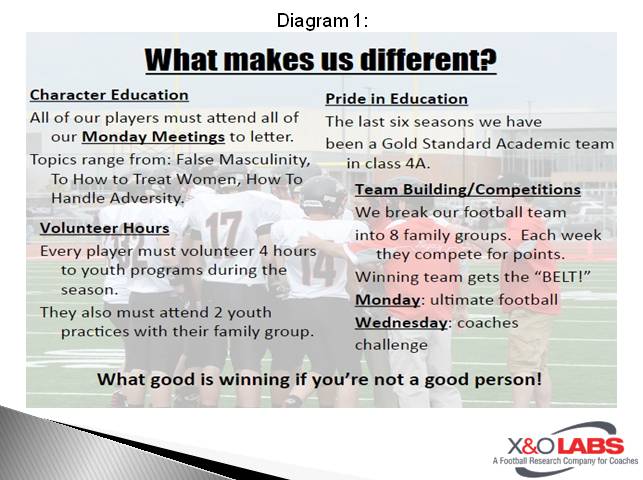By Mike Rowe
Head Football Coach/OC
Rocori High School (MN)
Twitter: @coachmikerowe
Introduction:
I always find that valuable lessons are learned not when things are going well, but when adversity has set in. After my second season in 2010 our program was in need of a shot in the arm. We finished the season 2-7 and I felt all the fun had vanished from practice because all we cared about was the almighty “W”. After the season ended I met individually with all 75 football players. What I learned from my players would forever changed how I will build and coach my teams.
Lesson 1: Family Groups: In 2010 our sophomores stated there was a disconnect between them and the seniors and that they didn’t always get along. This was a concern because each year we usually have any where from 4-8 sophomores that play varsity. The solution was to create a family atmosphere where everyone will care and help out one another. In our program, we make eight colored teams that compete against each other in lifting, attendance, and coaching competitions. We call them Family Groups. These Family Groups compete for a trophy called the “belt”. The belt is awarded to the team that accumulates the most points at the end of the year. What we found is that everyone wanted to win the belt. It created a strong bond that surprised even our coaching staff. We found that our seniors were more willing to pick up our sophomores that couldn’t drive for morning lifting. They even developed a phone list to call to make sure athletes were up so they wouldn’t miss morning lifting. By building relationships through competitions it created a bond with our players that would not break.

Lesson 2: Character Development: Another change we made in the program was creating a character education program called “Monday Meetings”. During our 2-7 season we lost a lot of games because when things got tough we backed down. By installing a character education program, we were able to create a weekly topic that would match that week’s game theme. Even more importantly, the character education program strives to also teach these young men how to be better people outside of our program. As a coach, I believe it is our responsibility to teach our football players how to be men. Times have changed and we believe it is no longer only the responsibility of parents to mentor young students. In order for our athletes to earn a letter, they needed to attend every one of our Monday Meetings. Some of the topics we covered were: gratitude; being a man for others; false masculinity; empathy; and how to treat women. Our athletes were extremely receptive to these topics and made changes to their daily lives that we observed, as well as were reported to us by their family members, faculty, and members of their communities. By creating a culture that takes away the importance of winning it has created more success for our program and I could have never imagined that happening.









